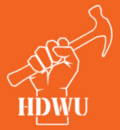A union is an organization of workers who share the goals of bettering their working conditions – typically by fighting for better pay, benefits, and working conditions.
As a union, workers exercise their collective power and advance their common interests via collective bargaining and direct workplace actions.
Notably, unions are nonprofit organizations, or 501c5 organizations under US tax code. They are not businesses.
Our union, Home Depot Workers United, is a group of associates from stores and facilities across the country fighting for fair compensation, safety and respect on the job.
When workers join together as a union, they can win substantial economic benefits and the majority of elections to form unions are successful. According to a 2022 brief from the US Congressional Joint Economic Committee:
• Unionized workers earn 10.2% more than their non-union peers, while also raising wages and benefits for all workers in their industry.
• Unionization increases wages by 23.1% for Latino workers, 17.3% for Black workers, and 14.7% for Asian workers.
• Overall, hourly wages for female union workers are 4.7% higher than for their non-union counterparts.
• Unionized workers’ employers pay 77.4% more per hour-worked towards the cost of health insurance.
• In total, there were 951 unionization elections held in 2021, 70% of which were successful.
The National Labor Relations Act (NLRA) is the law, passed by Congress in 1935, making clear that it is the policy of the United States to encourage collective bargaining by protecting workers’ full freedom of association.
The NLRA protects your rights to workplace democracy by providing employees at private-sector workplaces the fundamental right to seek better working conditions and designation of representation without fear of retaliation.
In other words, the NLRA guarantees your right to form or join a union. And your boss isn’t allowed to interfere with that.
The National Labor Relations Board (NLRB) is the independent federal agency created in 1935 to enforce the National Labor Relations Act. It safeguards workers’ rights to organize.
The NLRB has the power to prevent and remedy unfair labor practices. For example, it can order a company to reinstate and provide back pay to an illegally fired worker.
If you have heard of the NLRB, then you likely know that it conducts secret-ballot elections regarding union representation. Workers who win an NLRB election have successfully formed their union.
Section 7 of the National Labor Relations Act guarantees your right to engage in “concerted activity” for the purpose of collective bargaining, other mutual aid, or protection. You have these rights as a worker even before you form a union.
In addition to broad protections for concerted activities, Section 7 of the NLRA specifically protects the right to:
• Self-organization
• Form, join, or assist labor organizations
• Bargain collectively through representatives of employees’ own choosing
Concerted activity is sometimes called other names including protected activity, organizing rights, union rights, or simply, Section 7.
Under any name, concerted activity is the way that workers exercise their power and win improvements on the job.
An Unfair Labor Practice (ULP) is any illegal activity that violates federal labor law. For example, illegal activity by an employer in response to a worker organizing or participating in concerted activity.
Whenever an employer interferes with, restrains, or coerces workers in the exercise of the rights guaranteed under the National Labor Relations Act, that is an Unfair Labor Practice for which a worker can seek a legal remedy from the National Labor Relations Board.
Illegal activities that the NLRB can bring charges for include, but are not limited to:
• Threatening employees about participating or approving of union activity
• Interrogating employees about union activity or interest
• Promising employees some benefit or absence of punishment if they act against unionizing activity
• Spying on employees’ concerted activities
• Retaliation against employee unionizing efforts, employee filing of ULP charges against their employer, or providing testimony to the NLRB
• Refusal to bargain in good faith with a certified or recognized union
The NLRB has the power to impose fines and other penalties against employers who commit Unfair Labor Practices.
The first step to unionization is workers coming together to discuss their issues and concerns with their workplace. Communication and discussion is the backbone to organizing.
During this process, workers sign authorization cards or a petition. In either case, these documents state your desire to vote on unionization, desire to go through the collective bargaining process, and get filed with the NLRB. Importantly, these documents are never turned over to an employer. The only eyes that see them are your lead organizer’s and the NLRB.
At least 30% of the workers in a workplace have to sign a card or add their name to the petition before the NLRB will initiate a vote or election.
Once an election is held, a simple majority of workers have to vote for unionization for the election to pass. Once this happens, that workplace wins their election, is unionized, and enjoys all the benefits that come along with unionization.
Additionally, if a majority of workers in a workplace sign authorization cards or a petition, your employer can voluntarily recognize the union. It is rare that a company voluntarily recognizes a union, but it does happen as seen by Ben & Jerry’s and Scoopers United.
Ready to learn more?
Get in touch with a Home Depot associate who is already part of our organizing team and can answer your questions and help you get started.
